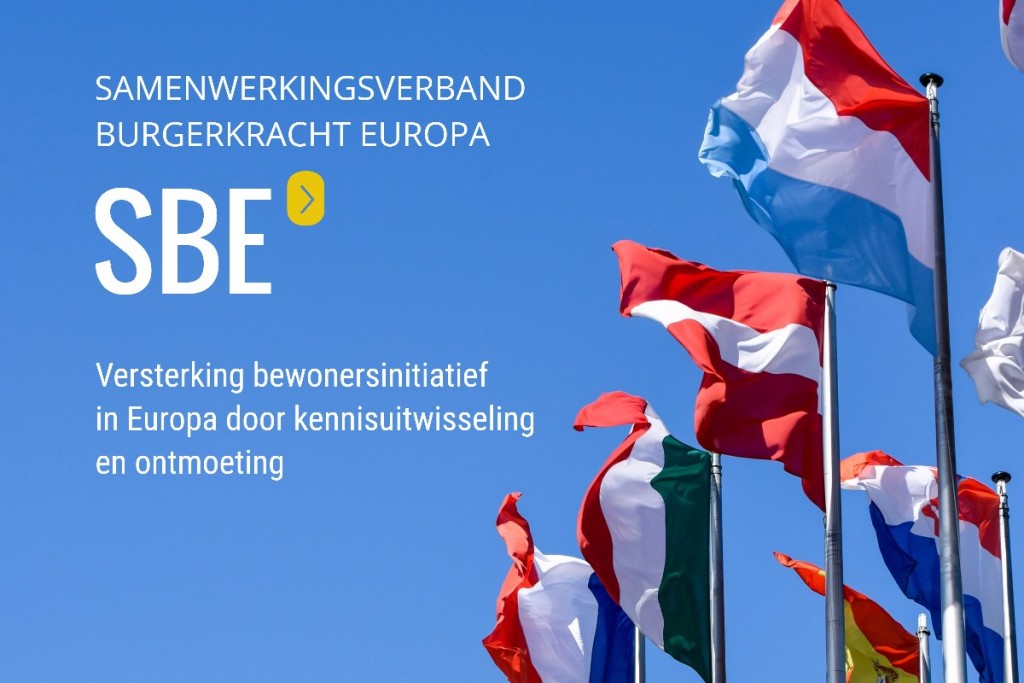
Report – SBE online symposium
Citizens throughout Europe are active with healthy food. They want to eat healthy, pay attention to its origin and sometimes grow it themselves. On Thursday, March 25th, we have shown successful examples of how citizens in the Netherlands, Germany, Belarus, Belgium, South Africa and Sweden are working with sustainable, local and healthy food.
Food for tomorrow? (Nijmegen / March 25th 2021)
Urban agriculture, healthy and sustainable choices and growing or preparing your food together: that is an important part of the future of our food. The future of our food starts today. The participants and organizers of the digital symposium ‚Food for tomorrow‘ agree on this … visitors from eight different countries attended the online event of the Samenwerkingsverband Burgerkracht Europa (SBE) about healthy and fair food.
Affordable, healthy and sustainable food, that is the future if you look at The Green Deal Sustainable Food Consumption. The Green Deal is aimed at making it easier and more attractive for consumers to eat healthier and more sustainably. During the digital symposium „Food for tomorrow“, citizen initiatives from different countries presented their small-scale solutions and successful activities in this field. “Looking across borders for inspiration”, SBE chairman Ben van Essen starts the afternoon. Maurits Steverink, coordinator platform Achterhoek Food adds: “What will we eat tomorrow? With the „What“ we reflect on making more conscious choices, with the „Tomorrow“ we look to the future and the impact of our choices on others and our environment.
Ecological living
Leen Laenens, chairman of Velt, is also looking to the future. Velt is an Association for Ecological Living and Gardening and its goal is: natural and healthy food, living with respect for our planet and ecological and pesticide-free gardening. Members are given various tips and tools for doing this. With small forms of urban agriculture and vegetable gardening, Velt is also getting more and more young people and neighborhood associations enthusiastic about ecological living.
Make healthy food cheaper
Food expert Jaap Seidell, professor of Nutrition and Health at VU University of Amsterdam also sees a future for self-harvesting, but is also an advocate of making it easier and cheaper for consumers to buy healthy and sustainable food in the supermarket. “The entire food system is geared towards trade, while it is important to focus on human well-being and the planet. Tackling nutrition helps with health problems, the environment and climate. “ According to Seidell, the transition to more plant-based nutrition begins, for example with local initiatives such as urban agriculture and school gardening.
Urban agriculture: sowing, harvesting and eating
In various workshops local initiatives are highlighted. As with an example of local urban agriculture: the Stadsboerin (city peasant woman) in Doetinchem on the site of the former prison De Kruisberg. Ellen Willems founded a foundation for gardening, harvesting and cooking together. “People today are far removed from the origin of food,” Willems explains. With dozens of volunteers, she maintains a butterfly garden, vegetable gardens, an orchard, flower picking garden and takes care of chickens and free-range pigs. Lena Friblick works similarly in Botildenborg, Sweden with more emphasis on integration, connecting cultures. She calls this social gastronomy.
Organize nearby
And also in Cape Town, urban agriculture is increasingly common, although there with a different cause: hunger. Drought, Covid-19, the lack of ownership of fertile land, cause a serious shortage of food there. In a study, urban farmers found solutions to this problem with small community nurseries, garden growers and sales in their own township.
Siarhei Tarasiuk and Tatjana Titulenko from the region Vileyka and Krasnopolie Belarus, gave an overview of two projects with focus on food, to involve people from different ages and different backgrounds, developing sustainable, healthy communities. Sabine Kopka (SOS Children’s Village, Düsseldorf) showed how in the Garath district in Düsseldorf, a new, ecologically-based SOS Children’s Village is being built by transforming a small shopping center into a large social center for all citizens.
Another way to encourage healthy eating is to start at an early age. For example, children from primary schools affiliated with the project „The Healthy Primary School of the Future“ are offered a daily routine with sufficient teaching time, exercise, play and attention to healthy food. Program manager Andrew Simons: “The children now drink more water, eat more fruit and vegetables and get less sugar and bind bad fats. Their belly fat is less and they maintain a more healthy weight. ”
Making sustainable choices
Small changes can also have a big effect for everyone who is no longer in primary school. For example, five HAN students from the Nutrition & Dietetics study program gave the participants tips on how to make more conscious, sustainable, but tasty food choices. “Buy and cook more to size, so you don’t have to throw anything away. Keep food in the right place. Choose legumes and nuts more often and go for seasonal products. ”
Closing
The two chairpersons concluded that in order to achieve the goals of the Green Deal, appreciation for residents‘ initiatives is just as necessary as adjustments in agricultural policy. They encouraged everyone to continue to actively promote fair and healthy food in any way. In this way we make the world more sustainable and healthier together.
Samenwerkingsverband Burgerkracht Europa (SBE)
The event was organized by the Samenwerkingsverband Burgerkracht Europa. The SBE organizes annual meetings to promote cross-border cooperation of citizen’ initiatives.
SBE is a cooperation between van de Landelijke Vereniging Kleine Kernen, Hogeschool van Arnhem en Nijmegen/Centrum of Expertise Krachtige Kernen, Forte Welzijn, Haarland Health Coaching, Vereniging Humanitas, Learn For Life. A special contribution was made by LEADER Achterhoek and SLE (Seminar für Ländliche Entwicklung/Centre for Rural Development, Humboldt-Universität zu Berlin).
More Resources:
- Food for Tomorow (English version >klick)
- Full program, all workshops as .pdf (>klick)


